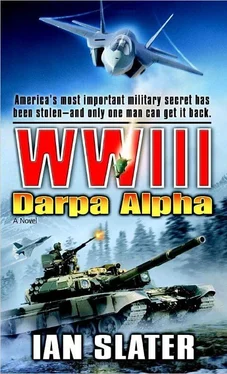“You’re joking,” said the pilot.
“No sirree. McCain ’s SES is sending us a fucking intercept about a fucking fox. A red fox.”
“Oh, well, then,” said the pilot, his voice dripping with sarcasm, “A red fox. A Commie fox. This could be very important, Dave. Better give it to the crew chief right now.”
The copilot summoned the crew chief. “Big intel coup, Chief. Better tell the general. And tell our fellow marines that amber warning’ll be in five.”
“Amber in five,” acknowledged the chief, “and red fox to the general. Got it.” The crew chief read the message, shaking his head. He, Freeman, and the marines were about to deplane and the enemy knew they were coming, even if they didn’t know the precise landing zones, and here was SES wasting everyone’s time. A red fox was kaput. Big deal.
The PA crackled as Freeman took the message.
“Oh shit!” It was the copilot. “Hold on, marines. We have several blips up ahead, chopper speed, but they aren’t friendlies. Our fighter jocks should take care of ’em, but we’ll be popping flares and may have to take evasive maneuvers.”
Freeman was alarmed and tried not to show it. The blips, he assumed, were probably ABC helos coming to attack but he was confident that the Harriers and four JSFs could deal with them. The red fox, however, worried him. “Chart?” he asked his SpecOp team interpreter. Lieutenant Johnny Lee brought it up on his laptop and showed him the SATPIX’s mines, a veritable moat of explosives around ABC, each mine indicated by a tiny “x.” From the angle Freeman was looking at them, they resembled a graveyard — hundreds of crosses.
“What’s up, sir?” Aussie asked the general, who didn’t hear him at first. The amber light came on. Ten minutes to green, and the air armada’s marines were gripping their weapons tightly, checking that their C-4 was safely packed, and doing deals with God. Senses were so strained that the stink of the scared soldiers, an oil drip from a leaking line, and vomit was overwhelming.
“General?” Aussie asked again.
“Damn fox,” said Freeman, his face tight with concern. “Killed on one of their mines. An SES intercept.”
Aussie’s brain was racing to keep up with Freeman, but sometimes that just wasn’t possible, given the breadth and depth of the general’s experience.
“A fox, wolf,” he told Aussie, “whatever, would never deliberately walk on a mine. They can smell anything that’s been handled by a human for months. Besides, carnivores’ve been hunted to damn near extinction, so they know better than to go anywhere near that H-block with all its odors. Which means it was well out on the perimeter.”
“Animal’d still smell it out there,” challenged Aussie.
“Yes,” conceded the general. “But there’s one thing, however, that’ll override human scent — any scent — so that even a fox with its nose to the ground’ll miss it.”
“Snow!” said Choir.
“Ten minutes to green!” shouted the crew chief.
“Snow!” said Freeman in disgust. “And we’re in NATO khaki green.”
“Shit!” said Aussie. “Must’ve fallen this morning.”
“And still falling,” said Freeman. “I’m going up to see the pilot. Bad enough we should have to try landing in snow, let alone sticking out like a whore’s tit once we deplane. Might as well paint targets on our ass.” He jabbed a finger at the laptop. “Our LZ is by a wood near this marshland. We could find cover in these woods outside the H-block perimeter.”
“Five minutes to green!” warned the crew chief. “Lock it up!” It was a new order occasioned by upgraded lock-in pins that secured the webbed shoulder and waist harnesses in the event of a hard landing.
“Maybe no snow’s fallen on the LZ,” said Aussie hopefully. “I mean maybe that was just a sick old fox. Couldn’t smell worth a damn, even though there was no snow to cover the mine?”
“Too many maybes,” said Freeman, but as he glanced down at the vastness of eastern Siberia he couldn’t see any snow, only the sheen of the lake. It was enormous. The marines heard a gut-punching thud as the hydraulics began alternately bleeding and gorging with fluid that would fully extend the helo’s huge rear ramp door. An enormous Russian sky stretched before them, but it came to an end farther west in what the SES had warned was a “significantly bruised line of L-3s,” thunderheads, stretching north to south like malevolent ships of the line. The Stallion, flying at 150 m.p.h. with a tailwind, was soon out of the mountainous and hilly country east of the lake, which they could see was completely frozen. Then they were descending over flatter, lower ground ten miles west of the lake, the land here a mere sixty-five yards above sea level, frozen but still no snow. Aussie could be right, the fox having detonated the mine not because snow had smothered the scent of it but because, quite simply, foxes, like humans, Aussie pointed out, aren’t always at the top of their game.
“Fact remains,” Freeman told Aussie, “I should have insisted on arctic white coveralls just in case.” He signaled the crew chief and asked him to check with the pilot for any sign on radar of snow clouds. The answer was that he couldn’t be sure but the line of L-3s was moving east toward them. Freeman turned his attention back to the dots — too slow for fighters, slow enough for helos — and a concomitant mass of smaller dots, as if a mass of iridescent pepper had been shaken on the screen.
“What do you think?” Freeman pressed the pilot. “Helos dropping chaff?” By “chaff” he meant strips of aluminum foil that would confuse enemy radar. In this case it would be impossible for the helos of the approaching MEU to get an accurate idea of the helo force approaching.
“That’s my guess, General,” the copilot said while feeding the larger dots on the radar screen into the computer’s memory to see whether there was a match between the radar signatures of the large dots and the known radar signatures of enemy aircraft types. The monitor’s orange-striped matchup bar was flashing the accompanying text: “Hind Mi-24,” a kind of attack helo.
“Bandit. Six miles and one o’clock.” In the Stallion’s cabin the red light was pulsing.
“Three minutes,” announced the chief. “Eight miles.” And Freeman knew that if the first wave faltered, failing either to keep the defenders inside the H-block’s perimeter or destroying the H-block itself, Moscow might summon the troops believed to be based in Kamen Rybolov, nine miles south of the ABC complex, to join the rebels. For a split second, Freeman recalled Patton telling the troops of Third Army that “Americans love a winner and will not tolerate a loser,” and Freeman’s 2IC, Robert Norton, saying that Russians liked to win just as much as Americans.
“It’s not snowing, sir,” the chief informed him, “but it looks like one mother of a rainstorm up ahead, another arctic blast coming in over China’s Wanda Shan Mountains.”
“Good,” said Freeman, which surprised Melissa Thomas. “Rain we can use.”
“One minute.”
“Bandit. Two miles! Evasive action.”
The radio seemed to explode in multichannel chaos, the Stallion descending, Cobra gunships and Mi-24s mixing it up. “Watch him, watch him! Lock him up, lock him up! Good kill!”
The general rose, grabbing the PA mike, grumpily brushing the flexi-cord away from his face. Melissa remembered how Kegg had told her, “The old man’s a dead ringer for George C. Scott.” She didn’t know who George C. Scott could be, but the phrase “dead ringer” bothered her, and in the midst of the din all around, she had the strangest premonition, stronger than any she’d ever had, that while Douglas Freeman might win this battle and pass into legend, it would be his last, that though victorious, he would, like Admiral Lord Nelson, die at the moment of his greatest triumph. She immediately told herself it was nothing more than a figment of her imagination, but the stark image of him falling in this, his last battle, gripped her like no other premonition ever had.
Читать дальше












